
The 2025 SMB Navigator Report is based on quantitative research conducted by Agile Market Intelligence that surveyed Australian businesses (n=506) and practising accountants (n=404), commissioned by Intuit QuickBooks. Data showed that despite strong client advocacy and satisfaction levels, most SMB–accountant relationships remain transactional, leaving a gap in strategic influence. This story explores how bridging the gap can spell success for both parties.
Key stats you need to know
- Accountants enjoy a Net Promoter Score (NPS) of +26 and majority satisfaction among their small and medium business clients.
- Yet, only 15% of SMBs see their accountant as a key strategic partner, while one in three view the relationship as purely transactional.
- Among strategic partnerships, 84% report value-for-money satisfaction, compared with only 33% in transactional relationships.
Strong advocacy isn’t translating into strategic influence
- The industry’s NPS sits at +26, with 43% promoters and 16% detractors.
- However, just 15% of all SMBs see their accountant as their “go-to” adviser for growth and success.
- One in three SMBs categorise their accountant relationship as purely transactional.
Accountants have a strong NPS at +26. Small and medium businesses are the most likely to recommend their accountant, with NPS scores of +31 and +29 respectively. However, only 15% of all businesses view accountants as strategic partners. Despite showing an uptick from last year’s (10%), this reveals that most relationships have an under-leveraged position. Many firms are delivering well on compliance and service but missing the opportunity to position themselves as indispensable advisers on broader business decisions.
“The data tells us accountants are trusted and valued – but too often as efficient service providers, not growth partners. Elevating the relationship means moving beyond compliance into the conversations that shape a client’s business direction.” – Michael Johnson, Director at Agile Market Intelligence
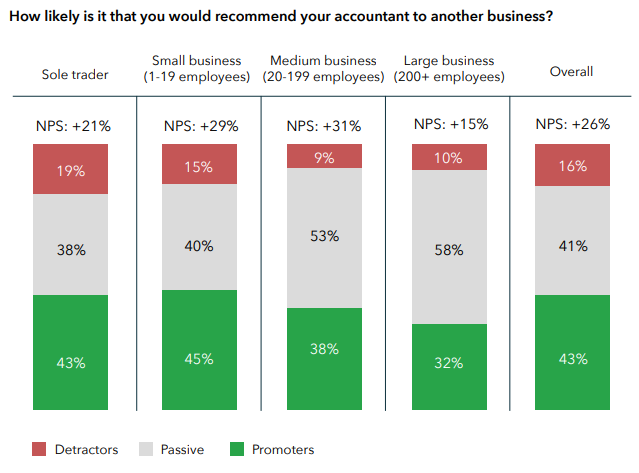

Businesses who view their accountants as ‘key strategic partners’ feel they get more value for their money
- In 2025, 44% of all SMBs say they “definitely” get value for money from their accountant.
- Among strategic partnerships, that figure jumps to 84%, compared with just 33% for transactional relationships.
- One in three SMBs categorise their accountant relationship as purely transactional.
When businesses recognise their accountants as key strategic partners, it translates to valuing their investment and also increases their satisfaction. Businesses in strategic partnership are willing to invest more, 32% spend over $50,000 annually on accounting, versus only 11% in transactional relationships. Beyond tax compliance, payroll and bookkeeping, accountants can positively impact business performance when they include strategy, planning advisory services.
“Value-for-money perception isn’t just about price. It’s about relevance. When accountants are involved in strategic decisions, clients see the connection between their fee and their future growth.” – Michael Johnson
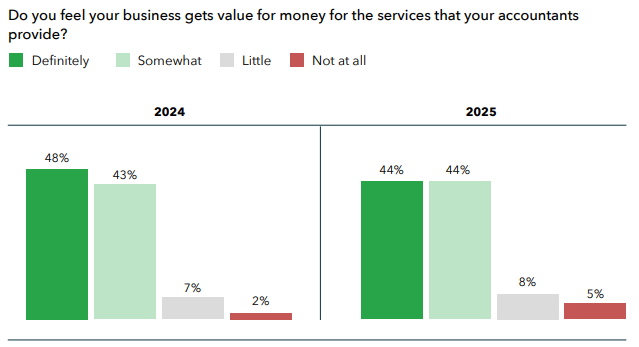
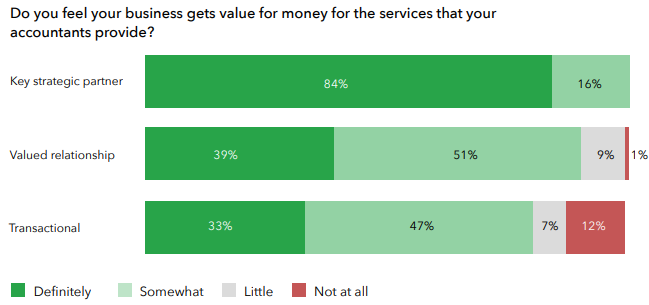
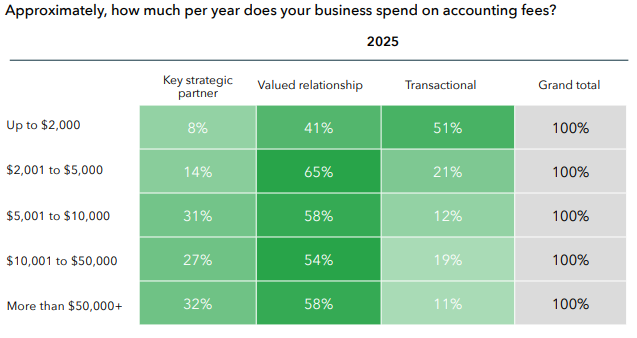
Accounting firms also aspire to be in key strategic roles for their clients
- Over 76% of accounting firms would prefer to shift their focus on helping clients run their business through structure and tax planning.
- 57% of accounting firms see accounting technology and data planning as a service they can offer for their clientele.
- Tech enablement represents an accessible entry point into broader strategic engagement.
Traditional services such as bookkeeping and payroll are services that 17-18% of accountants would like to decrease their focus on. Instead, business planning, forecasting, reporting and advising are services which accountants have a higher preference for (76-78%). While only 15% of SMBs currently see their accountants as partners, there is a clear desire to move from existing valued or transactional relationships to key strategic partnership from both sides of the table. One step accountants can take is through technology advisory, which could start their repositioning toward strategic partners. By moving from tool recommendations into embedding those tools in business workflows, accountants can link their role directly to operational improvement and growth.
“Advisory doesn’t have to start with a boardroom strategy session. For many clients, the first step is helping them choose and embed the right tech. That’s often where the trust to have bigger conversations is built.” – Michael Johnson
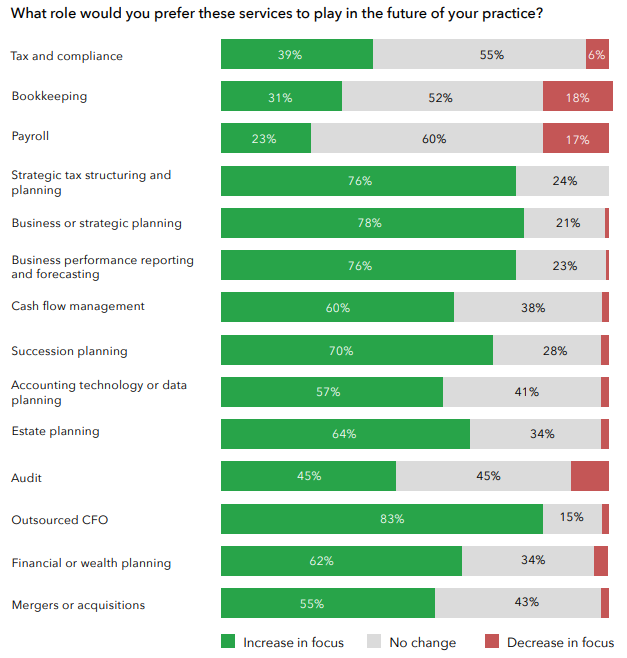
About the research
The SMB Navigator Report 2025 is based on quantitative research conducted by Agile Market Intelligence between December 2024 and January 2025 and was commissioned by Intuit QuickBooks. It includes responses from 506 Australian small businesses and 404 practising accountants. The business sample has been weighted to reflect the national distribution of business size and annual revenue, based on data from the Australian Small Business and Family Enterprise Ombudsman (ASBFEO).
You can download the report here.


